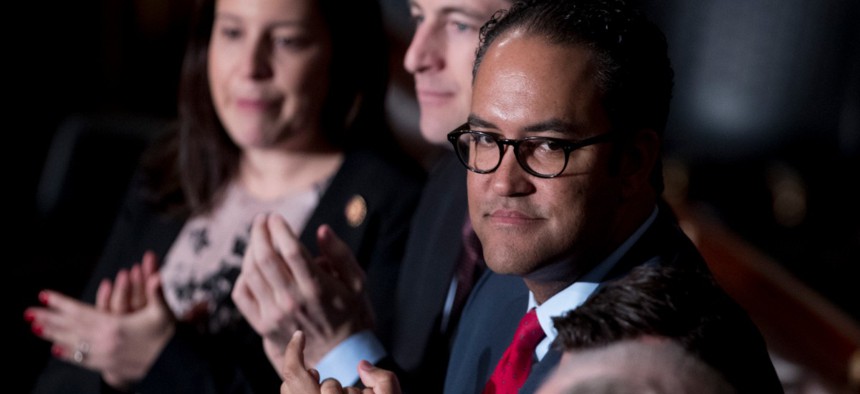Will Hurd, The Most Vocal Lawmaker on Federal IT Issues, Won’t Seek Reelection

Rep. Will Hurd Andrew Harnik/Shutterstock.com
The three-term congressman plans to keep pushing on government IT issues from the private sector.
Rep. Will Hurd, a three-term Republican congressman from Texas and vocal proponent of modernizing the technology and processes used by federal agencies, announced Thursday he will not be seeking a fourth term.
In a post on his Congressional website Thursday evening, Hurd cites many pressing issues facing the nation: the economic struggle with China, the race for dominance in artificial intelligence, increases in cyberattacks, and the crises in Central America that have led to an influx of migrants seeking asylum at our borders.
“After reflecting on how best to help our country address these challenges, I have made the decision to not seek reelection for the 23rd Congressional District of Texas in order to pursue opportunities outside the halls of Congress to solve problems at the nexus between technology and national security,” he wrote.
In the post, Hurd—a former CIA undercover agent with a background in IT—lists some of his most cherished accomplishments. Among them: Making “sure taxpayer money was used more efficiently by changing how the government purchases IT goods and services.”
Hurd noted federal IT acquisition isn’t the sexiest topic—a refrain he had said many times before, including last year on Nextgov’s Critical Update podcast.
“I always say, ‘IT procurement is not a sexy topic,’” he said in the July 2018 interview. “I don’t think anyone’s ever held a parade in honor of IT procurement. But it is something that could ultimately change the way the government operates. It’s the way that we’re going to ensure the federal government is spending its money wisely.”
Hurd sponsored or worked on many federal IT-related bills, the most significant being the Modernizing Government Technology, or MGT, Act, which established the idea of agency working capital funds to reprogram savings from IT upgrades to put toward other modernization needs, as well as the Technology Modernization Fund, a central fund from which agencies can apply for money for IT modernization projects.
The modernization fund was originally proposed during the Obama administration—which wanted $3.1 billion for the effort—but was rejected by a Republican Congress. Hurd worked with members from both parties to craft the compromise MGT bill, which created the central fund—albeit much smaller than first proposed—while also putting an onus on agencies to put savings toward future projects.
“Will’s forward-thinking approach has helped bring government into the 21st century,” House Minority Leader Kevin McCarthy, R-Calif., told Nextgov in a statement. “His leadership on the Modernizing Government Technology Act established a new baseline for how government serves its citizens. That type of thinking will be missed but I look forward to him making important contributions to our country outside the halls of Congress.”
Hurd also sponsored several other IT-focused bills. Some passed, such as the Department of Homeland Security Data Framework Act and the Strengthening and Enhancing Cyber-capabilities by Utilizing Risk Exposure Technology Act. Others, like the Federal CIO Authorization Act, passed the House—twice—but never made it into law.
Rep. Robin Kelly, D-Ill., who served with Hurd as ranking member of the now-defunct House Oversight Subcommittee on IT, co-sponsored the Federal CIO Authorization Act and plans to continue working with her colleague on federal IT issues for his remaining 17 months in office. That work includes their co-sponsored Internet of Things Cybersecurity Improvement Act.
“I’d like to thank Will for his friendship, leadership and partnership,” Kelly told Nextgov in a statement. “Together, he and I have passed revolutionary bills that will spur innovation, protect critical systems and save taxpayers’ money. And we did it all the right way: through a bipartisan, transparent and committee-driven process that allowed all stakeholders a voice in the policymaking process.”
“I couldn’t be prouder of what we’ve achieved or that we did it together,” she added. “I wish Will all the best in all that comes next.”
As leaders of the IT subcommittee, Kelly also worked with Hurd on the biannual Federal Information Technology Acquisition Reform Act scorecards.
The scorecards began as a tool for measuring agencies’ progress against a specific law—FITARA—but under Hurd’s leadership morphed into a “hygiene” scorecard covering everything from software licensing to CIO authorities to cybersecurity. After the subcommittee was shuttered, Rep. Gerry Connolly, D-Va.—who cosponsored FITARA—took the reins of the new Government Operations Subcommittee but kept the additions to the scorecard.
Connolly was away on House business Friday and was not able to comment for this article, per a spokesperson.
While there are other members of the House and Senate who care about technology, none were as focused on the issues plaguing the federal IT community.
“I was disappointed to hear that Congressman Hurd has decided not to seek re-election,” strategist Mike Hettinger, a former congressional aide with a focus on IT issues, told Nextgov. “He is one of a handful of members that both understands and cares about federal IT and cybersecurity issues. His departure leaves a void on these critical issues, at a critical time. His leadership in Congress will be greatly missed.”
Hurd won three elections in an extremely competitive district, winning his last by a margin of fewer than 1,000 votes.
NEXT STORY: Quick Hits






